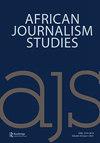The Continued Domination of Western Journalists in Global African News Telling: The Imperatives and Implications
IF 1.8
3区 文学
Q3 COMMUNICATION
引用次数: 3
Abstract
ABSTRACT Who reports Africa in the British press? This longitudinal study is aimed at addressing the issue. It applied content analysis methodology, the use of four British national newspapers and a sample duration that spanned between 1992 and 2017. It uncovered that Western journalists consistently dominated the reportage of Africa without any exception throughout the sample period. Apart from Western journalists, other journalists or sources involved in the media coverage—African local journalists, Afro-Western journalists, joint journalists, and news agencies’ African reports were insignificantly used. Also, this study further revealed that the use of news agencies’ African reports had a continuous decline from 1997 to 2017. Therefore, the domination of the British press coverage of Africa over the years by Western journalists results in the portrayal of Africa from an imbalanced single prism of Westernised perspective, thereby resulting in the poor coverage of Africa and the spread of further ignorance of the continent to the global audience, which hampers both tourism and Western business investments to Africa. This study concludes that who reports Africa in the UK press is embedded in neo-colonialism, white hegemony, and inequality.西方记者在全球非洲新闻报道中的持续主导地位:必要性和启示
摘要英国媒体谁报道非洲?这项纵向研究旨在解决这一问题。它采用了内容分析方法,使用了四份英国全国性报纸,并在1992年至2017年间进行了抽样调查。研究发现,在整个样本期内,西方记者无一例外地一直主导着非洲的报道。除了西方记者之外,参与媒体报道的其他记者或消息来源——非洲当地记者、非洲-西方记者、联合记者和新闻机构的非洲报道——也没有被大量使用。此外,这项研究进一步表明,从1997年到2017年,新闻机构对非洲报道的使用量持续下降。因此,多年来,西方记者在英国媒体对非洲的报道中占据主导地位,导致从西方化的角度对非洲进行了不平衡的单一棱镜描述,从而导致了对非洲的糟糕报道,并进一步向全球观众传播了对非洲大陆的无知,这阻碍了西方对非洲的旅游业和商业投资。这项研究得出的结论是,世卫组织在英国媒体上对非洲的报道植根于新殖民主义、白人霸权和不平等。
本文章由计算机程序翻译,如有差异,请以英文原文为准。
求助全文
约1分钟内获得全文
求助全文
来源期刊

African Journalism Studies
COMMUNICATION-
CiteScore
1.90
自引率
10.00%
发文量
18
期刊介绍:
Accredited by the South African Department of Higher Education and Training for university research purposes African Journalism Studies subscribes to the Code of Best Practice for Peer Reviewed Scholarly Journals of the Academy of Science of South Africa. African Journalism Studies ( AJS) aims to contribute to the ongoing extension of the theories, methodologies and empirical data to under-researched areas of knowledge production, through its emphasis on African journalism studies within a broader, comparative perspective of the Global South. AJS strives for theoretical diversity and methodological inclusivity, by developing theoretical approaches and making critical interventions in global scholarly debates. The journal''s comparative and interdisciplinary approach is informed by the related fields of cultural and media studies, communication studies, African studies, politics, and sociology. The field of journalism studies is understood broadly, as including the practices, norms, value systems, frameworks of representation, audiences, platforms, industries, theories and power relations that relate to the production, consumption and study of journalism. A wide definition of journalism is used, which extends beyond news and current affairs to include digital and social media, documentary film and narrative non-fiction.
 求助内容:
求助内容: 应助结果提醒方式:
应助结果提醒方式:


